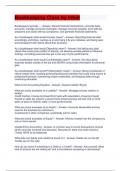Exam (elaborations)
Bookkeeping Class by Intuit Questions with Answers
- Course
- Institution
Bookkeeping Class by Intuit Bookkeepers typically... - Answer- Record financial transactions, reconcile bank accounts, manage accounts receivable, manage accounts payable, work with tax preparers and assist with tax compliance, and generate financial statements. As a bookkeeper what would Hon...
[Show more]



